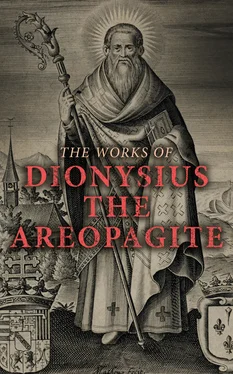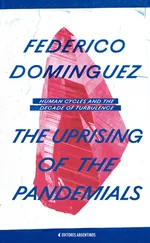SECTION III.
Following then, these, the supremely Divine standards, which also govern the whole holy ranks of the supercelestial orders,—whilst honouring the unrevealed of the Godhead which is beyond mind and matter, with inscrutable and holy reverence of mind, and things unutterable, with a prudent silence, we elevate ourselves to the glories which illuminate us in the sacred Oracles, and are led by their light to the supremely Divine Hymns, by which we are supermundanely enlightened and moulded to the sacred Songs of Praise, so as both to see the supremely Divine illuminations given to us by them, according to our capacities, and to praise the good-giving Source of every holy manifestation of light, as Itself has taught concerning Itself in the sacred Oracles. For instance, that It is cause and origin and essence and life of all things; and even of those who fall away from It, both recalling and resurrection; and of those who have lapsed to the perversion of the Divine likeness, renewal and reformation; of those who are tossed about in a sort of irreligious unsteadiness, a religious stability; of those who have continued to stand, steadfastness; of those who are being conducted to It, a protecting Conductor; of those being illuminated, illumination; of those being perfected, source of perfection; of those being deified, source of deification; of those being simplified, simplification; of those being unified, unity; of every origin superessentially super-original origin; and of the Hidden, as far as is right, beneficent communication; and, in one word, the life of the living, and essence of things that be; of all life and essence, origin and cause; because Its goodness produces and sustains things that be, in their being.
SECTION IV.
These things we have learned from the Divine Oracles, and you will find all the sacred Hymnology, so to speak, of the Theologians arranging the Names, of God with a view to make known and praise the beneficent progressions of the Godhead. Hence, we see in almost every theological treatise the Godhead religiously celebrated, both as Monad and unity, on account of the simplicity and oneness of Its supernatural indivisibility from which, as an unifying power, we are unified, and when our divided diversities have been folded together, in a manner supermundane, we are collected into a godlike unit and divinely-imitated union; but, also as Triad, on account of the tri-personal manifestation of the superessential productiveness, from which all paternity in heaven and on earth is, and is named; also, as cause of things existing, since all things were brought into being on account of Its creative goodness, both wise and good, because all things, whilst preserving the properties of their own nature unimpaired, are filled with every inspired harmony and holy comeliness, but pre-eminently, as loving towards man, because It truly and wholly shared, in one of Its Persons (subsistencies), in things belonging to us, recalling to Itself and replacing the human extremity, out of which, in a manner unutterable, the simplex Jesus was composed, and the Everlasting took a temporal duration, and He, Who is superessentially exalted above every rank throughout all nature, became within our nature, whilst retaining the unchangeable and unconfused steadfastness of His own properties. And whatever other divinely-wrought illuminations, conformable to the Oracles, the secret tradition of our inspired leaders bequeathed to us for our enlightenment, in these also we have been initiated; now indeed, according to our capacity, through the sacred veils of the loving-kindness towards man, made known in the Oracles and hierarchical traditions, which envelop things intellectual in things sensible, and things superessential in things that are; and place forms and shapes around the formless and shapeless, and multiply and fashion the supernatural and formless simplicity in the variedness of the divided symbols; but, then, when we have become incorruptible and immortal, and have reached the Christlike and most blessed repose, according to the Divine saying, we shall be “ever with the Lord,” fulfilled, through all-pure contemplations, with the visible manifestation of God covering us with glory, in most brilliant splendours, as the disciples in the most Divine Transfiguration, and participating in His gift of spiritual light, with unimpassioned and immaterial mind; and, even in the union beyond conception, through the agnostic and most blessed efforts after rays of surpassing brilliancy, in a more Divine imitation of the supercelestial minds. For we shall be equal to the angels, as the truth of the Oracles affirms, and sons of God, being sons of the resurrection. But now, to the best of our ability, we use symbols appropriate to things Divine, and from these again we elevate ourselves, according to our degree, to the simple and unified truth of the spiritual visions; and after our every conception of things godlike, laying aside our mental energies, we cast ourselves, to the best of our ability, towards the superessential ray, in which all the terms of every kind of knowledge pre-existed in a manner beyond expression, which it is neither possible to conceive nor express, nor entirely in any way to contemplate, on account of Its being pre-eminently above all things, and super-unknown, and Its having previously contained within Itself, superessentially, the whole perfections of all kinds of essential knowledge and power, and Its being firmly fixed by Its absolute power, above all, even the supercelestial minds. For, if all kinds of knowledge are of things existing, and are limited to things existing, that, beyond all essence, is also elevated above all knowledge.
SECTION V.
And yet, if It is superior to every expression and every knowledge, and is altogether placed above mind and essence,—being such as embraces and unites and comprehends and anticipates all things, but Itself is altogether incomprehensible to all, and of It, there is neither perception nor imagination, nor surmise, nor name, nor expression, nor contact, nor science;—in what way can our treatise thoroughly investigate the meaning of the Divine Names, when the superessential Deity is shewn to be without Name, and above Name?
But, as we said when we put forth the Theological Outlines, it is not possible either to express or to conceive what the One, the Unknown, the Superessential self-existing Good is,—I mean the threefold Unity, the alike God, and the alike Good. But even the unions, such as befit angels, of the holy Powers, whether we must call them efforts after, or receptions from, the super-Unknown and surpassing Goodness, are both unutterable and unknown, and exist in those angels alone who, above angelic knowledge, are deemed worthy of them. The godlike minds (men) made one by these unions, through imitation of angels as far as attainable (since it is during cessation of every mental energy that such an union as this of the deified minds towards the super-divine light takes place) celebrate It most appropriately through the abstraction of all created things—enlightened in this matter, truly and super-naturally from the most blessed union towards It—that It is Cause Indeed of all things existing, but Itself none of them, as being superessentially elevated above all. To none, indeed, who are lovers of the Truth above all Truth, is it permitted to celebrate the supremely-Divine Essentiality—that which is the super-subsistence of the super-goodness,—neither as word or power, neither as mind or life or essence, but as pre-eminently separated from every condition, movement, life, imagination, surmise, name, word, thought, conception, essence, position, stability, union, boundary, infinitude, all things whatever. But since, as sustaining source of goodness, by the very fact of Its being, It is cause of all things that be, from all created things must we celebrate the benevolent Providence of the Godhead; for all things are both around It and for It, and It is before all things, and all things in It consist, and by Its being is the production and sustenance of the whole, and all things aspire to It—the intellectual and rational, by means of knowledge—things inferior to these, through the senses, and other things by living movement, or substantial and habitual aptitude.
Читать дальше












